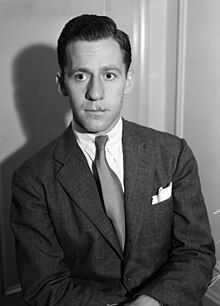John Swope (photographer)
John Swope | |
|---|---|
 Swope in 1934 | |
| Born | August 23, 1908 |
| Died | May 11, 1979 (aged 70) Los Angeles, California, U.S. |
| Known for | Photography |
| Spouse | |
| Children | 2, including Topo Swope |
| Website | www |
John Swope (August 23, 1908 – May 11, 1979) was a photographer for Life,[1][2] and a commercial pilot who trained United States Army Air Forces pilots during World War II.[2]
Biography
[edit]He was born in New Brunswick, New Jersey in 1908.[3]
He attended Harvard University in 1930. There, he joined the theatrical group University Players, where Henry Fonda, James Stewart, Margaret Sullavan and Joshua Logan were also members.[4]
His interest in photography began when he brought a camera to a yacht race from Los Angeles to Hawaii in 1936.[3]
Together with Leland Hayward and John H. Connelly, he co-founded Southwest Airways (no connection to the present day Southwest Airlines), a company that developed the Thunderbird Fields, which trained thousands of military pilots during the Second World War.[2][5]
He was married to actress Dorothy McGuire in 1943 until his death on May 11, 1979.[citation needed] Together they had two children.
Career
[edit]He started his career by documenting federal housing projects, a part of Franklin D. Roosevelt's New Deal Program.[6]
1936 — He worked as an assistant to Leland Heyward.[7]
1938 — He was commissioned to photograph the work of nurses in Harlem and the Lower East Side by Henry Street Settlement House.[3]
1939 — He was assigned by Harper's Bazaar in South America with Joshua Logan.[3]
1941 — He began training Aviation cadets in Thunderbird Airfield right after he joined the Army.[6]
1942 — He collaborated with John Steinbeck on an illustrated book, Bombs Away: The Story of a Bomber Team, which documented the training of army cadets.[6]
1945 — He joined the Naval Reserve as a photographer. His first assignment, in June 1945, was to photograph an overseas military flight from Maryland to Paris.[8]
1946 — Began his freelancing career again after his discharge from the Navy. He produced a theatrical play at the La Jolla Playhouse.[6]
1975 — Photographed palaces of the maharajahs in India for the James Ivory book, Autobiography of a Princess[9]
Influences
[edit]John Swope broke the mold of Hollywood's glamour shots when he burst in the scene in 1936.[10] What makes his work unique is how he used available light, shot from unusual angles, and informal portraits. This might come from his influence of Mondrian's use of linear space.[11]
Exhibitions
[edit]- A Letter from Japan: The Photographs of John Swope - taken in August 1945 documents the devastation caused by World War II. This photographic essay was complemented by a 144-page letter to his wife Dorothy McGuire describing in detail his emotional experience when shooting these images.[6][12][13][14]
- Swope's photography has been the subject of five solo exhibitions at Craig Krull Gallery in Santa Monica, California; "Trees" in 2006, "New York" in 2005, "Photographs" in 2003, "Camera over Hollywood" in 2001, and "A View from Above" in 1996.[15]
Books
[edit]External links
[edit]- John Swope at IMDb
- Swope's photographs at MPTV Images.
References
[edit]- ^ "John Swope at Craig Krull Gallery". Craig Krull Gallery. Retrieved November 17, 2010.
Swope was born in New Brunswick, New Jersey in 1908. ... died in Los Angeles in 1979.
- ^ a b c "Arizona Memory Project : Browse". Azmemory.lib.az.us. Archived from the original on January 2, 2011. Retrieved December 23, 2010.
- ^ a b c d Swope, John. "John Swope at Craig Krull Gallery". Craigkrullgallery.com. Retrieved February 28, 2011.
- ^ S. Ballard (2010-04-11). "notredamephoto: John Swope". Notredamephoto.blogspot.com. Retrieved 2010-12-23.
- ^ "Oldies and Oddities: Tinseltown's Training Base". Air & Space/Smithsonian magazine. Retrieved November 21, 2010.
They enlisted John Swope, a commercial pilot and photographer who had once shared a bachelor pad with Jimmy Stewart and Henry Fonda and who would later collaborate with John Steinbeck on the book Bombs Away.
- ^ a b c d e f "Armand Hammer Museum of Art and Cultural Center". Tfaoi.com. Retrieved December 23, 2010.
- ^ "Camera Over Hollywood: Photographs by John Swope, 1936-1938 — Presentation House Gallery". Absolutearts.com. Retrieved December 23, 2010.
- ^ "Three American Photographers, Block Museum, Northwestern University". Blockmuseum.northwestern.edu. Archived from the original on April 21, 2011. Retrieved December 23, 2010.
- ^ a b "John Swope Exhibit Shows the True Face of Hollywood | Art Business News | Find Articles at BNET". Findarticles.com. Archived from the original on October 12, 2007. Retrieved February 28, 2011.
- ^ "John Swope Exhibit Shows the True Face of Hollywood. (Brief Article)". November 1, 2000.[dead link]
- ^ "John Swope at Craig Krull Gallery". Craigkrullgallery.com. Retrieved February 28, 2011.
- ^ "Steidl". Steidlville.com. Retrieved December 23, 2010.
- ^ "A Letter from Japan - Exhibitions - Hammer Museum". Hammer.ucla.edu. Archived from the original on April 8, 2011. Retrieved December 23, 2010.
- ^ "Sake-Drenched Postcards - John Swope: A Letter from Japan". Bigempire.com. Retrieved December 23, 2010.
- ^ "Past Exhibitions at Craig Krull Gallery". craigkrullgallery.com. Archived from the original on 2011-06-06. Retrieved 2011-05-20.
